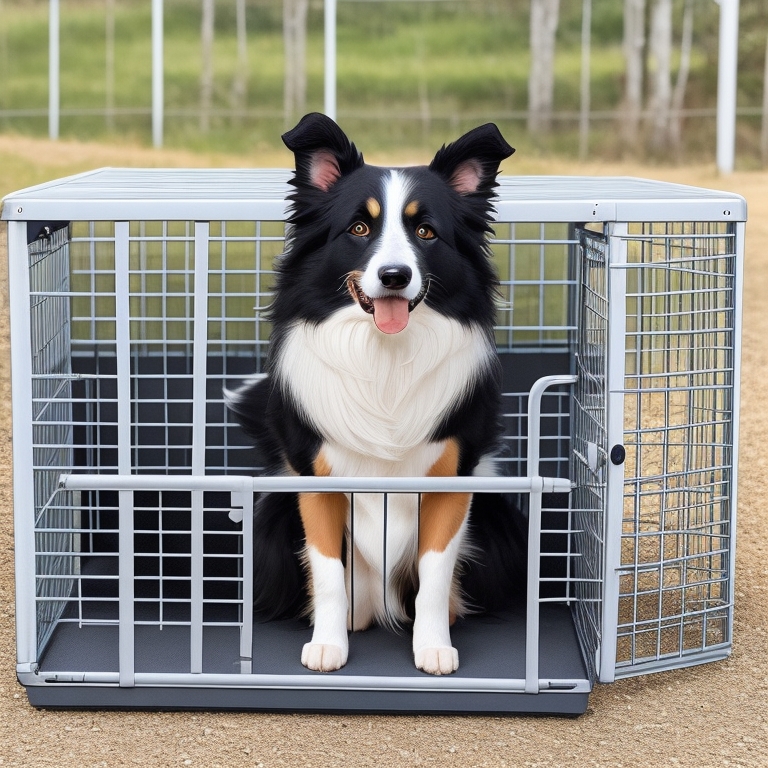Does a Border Collie Bark a Lot?
Do you own a Border Collie and find yourself wondering why they bark so much? Well, it’s not just your dog; this breed is known for its excessive barking.
But why do they do it?
In this blog, we’ll explore the nature of Border Collies and the various reasons behind their barking behavior. Additionally, we’ll also take a look at what is considered normal barking and provide some effective techniques for controlling and minimizing excessive barking.
So, if you’re tired of your furry friend’s constant noise and want to learn how to reduce it, keep reading!
| Question | Answer |
| Is the Border Collie a vocal breed? | Yes, the Border Collie is known to be a vocal breed. |
| How often does the Border Collie bark? | The frequency of barking can vary from individual to individual, but the breed as a whole is known to bark more than some other breeds. |
| What are some common reasons why a Border Collie might bark? | Border Collies may bark to communicate, to alert their owner to a potential threat or danger, or out of excitement or boredom. |
| Can training help reduce excessive barking in Border Collies? | Yes, training can help teach a Border Collie when it is appropriate to bark and when to remain quiet, and can reduce excessive barking. |
| What are some other methods to reduce excessive barking? | Providing plenty of exercise and mental stimulation, using positive reinforcement to reward quiet behavior, and incorporating calming techniques such as massage and aromatherapy can all help reduce excessive barking in Border Collies. |
Why Border Collies Bark?
Nature of Border Collies
Border Collies are known for their energy, intelligence, and enthusiasm for work. These dogs were originally bred for herding sheep, which means their nature includes a strong herding instinct, high energy level, and a need for mental stimulation.
They are also highly sensitive and responsive to their environment and their owners.
Because of their herding nature, Border Collies may be prone to excessive barking, especially when they feel bored, anxious, or when they want to gain your attention. If they don’t get enough exercise or mental stimulation, they may become restless and start barking excessively.
At times, they may bark to protect their territory or to alert their owner of perceived threats.
It is also crucial to point out that Border Collies are not a breed that is content with just lounging around the house all day. They require plenty of physical exercise, mental stimulation, and routine.
This combination helps to meet their physical and emotional needs, which can prevent unnecessary barking and other behavioral problems.
In essence, understanding the nature of Border Collies and their herding background can help prevent excessive barking behaviors. With consistent exercise, mental stimulation, and training, it’s possible to mitigate barking and other behavioral issues.
However, it’s essential to recognize that every dog’s personality is unique, and some Border Collies may bark more than others, even with proper exercise and training.
Reasons for excessive barking
Border Collies are known for being an intelligent and active breed of dogs. These dogs require a lot of mental and physical stimulation to stay healthy and happy.
When bored, anxious or seeking attention, Border Collies tend to bark excessively.
Additionally, their territorial and herding instincts may trigger excessive barking. Boredom and anxiety are the two primary reasons why Border Collies bark excessively.
These dogs need a lot of mental and physical stimulation, failure to which they get bored and anxious, and begin barking.
Excessive barking is also a territorial instinct for these dogs. They tend to bark at everything they feel is a threat to their home or humans.
Attention-seeking behavior is the third reason why Border Collies bark excessively.
These dogs are playful and social animals, at times they just want some attention from their owners, and barking is their way of getting it. Lastly, Border Collies are herders, and their instinct demands that they move things around, including people, and they bark to move them.
Border Collies are an active, intelligent, and social breed of dogs, but they require a lot of attention, training, and stimulation to prevent them from barking excessively.

Boredom and anxiety
Border Collies are known to be high-energy and intelligent dogs, which means they need plenty of physical exercise and mentally stimulating activities to keep them engaged and happy. Lack of proper exercise or mental stimulation can easily cause boredom and anxiety in these dogs, leading to excessive barking.
If you notice your Border Collie barking excessively, it might be due to boredom or anxiety.
Boredom is a common cause of excessive barking in these dogs, especially if they are left alone for long periods with nothing to do. Separation anxiety is another reason for excessive barking, as Border Collies are highly social animals and crave human attention and interaction.
To prevent excessive barking due to boredom and anxiety, ensure that your Border Collie gets enough exercise and playtime each day.
You can also provide them with interactive toys, puzzles, and games that challenge them mentally and keep them occupied. Also, make sure that your Border Collie has plenty of social interaction and attention.
They love human companionship, so spending quality time with your dog is essential to keep them happy and prevent anxiety.
In summary, Border Collies bark a lot due to boredom and anxiety, and the best way to prevent excessive barking is to provide them with enough exercise, mental stimulation, and social interaction.

Territorial instinct
Territorial instinct is a significant contributing factor to excessive barking in Border Collies. As herding dogs, they have an inherent need to protect their territory and alert their owners to potential threats.
This instinct can cause them to bark incessantly at strangers, other pets, or anything perceived as a threat to their territory.
If a Border Collie feels that their territory is being invaded, they will bark to warn intruders away. This behavior is a natural trait that is difficult to eradicate entirely, but with proper training and socialization, it can be managed.
As a responsible owner, it is essential to understand that this instinct is not a problem that can be solved overnight.
Consistency and patience are required to train your dog to manage territorial behavior. Therefore, in the next section, we will explore the nature of Border Collies in detail and identify other reasons for intense barking habits.

Attention-seeking behavior
Looking for attention is one of the primary reasons why Border Collies bark excessively. They are social animals and enjoy being around their owners.
When they don’t receive enough attention or feel lonely or isolated, they tend to bark.
If you work long hours and leave your Border Collie alone for extended periods, they may bark excessively to get your attention once you return home. Border Collies are also intelligent and thrive when engaged in activities.
If they feel unchallenged or bored, they may bark excessively to get your attention or ask to play.
Giving your dog enough attention and setting aside time to exercise and play with them can help reduce unwanted barking. Furthermore, some Border Collies may bark excessively to communicate their needs or desires.
If your dog barks at you on the couch, they probably want to cuddle.
If they bark near the front door, they might want to go play outside. It’s essential to understand your dog’s body language and sounds, so you can decipher what they want.
In summary, attention-seeking behavior is a common cause of excessive barking in Border Collies.
They crave attention and engagement from their owners. Providing enough attention, exercise, playtime, and mental stimulation can help reduce unwanted barking.

Herding instinct
You might have noticed that Border Collies bark more than other breeds of dogs, and one of the primary reasons is their herding instinct. Border Collies are herding dogs, and it is an inherent nature for them to bark to control and move livestock such as sheep or cattle.
Even if there are no livestock to herd, Border Collies still have this instinct and tend to apply it in their daily lives.
This can lead to excessive barking, especially when they feel bored, agitated, or anxious. As a responsible pet owner, it is important to understand the herding instinct of Border Collies and find ways to address their barking habits.
In the next sections of this blog, we will discuss different reasons for excessive barking and effective training techniques to control barking.
How Much Barking is Normal?
Frequency and duration of barking
Let’s get straight to the point, do Border Collies bark a lot, and how frequently do they bark? Border Collies are energetic dogs with strong instincts, and they do bark frequently, but it’s not excessive if they are adequately stimulated.
In general, on average, Border Collies bark for about 30 minutes a day.
However, this time can vary depending on the individual dog and the situation they are in. For instance, if they are anxious or bored, they might bark more frequently.
It’s important to note that different breeds of dogs bark differently and for different reasons.
However, compared to other breeds, Border Collies bark less with a moderate volume. It’s a good idea to observe and understand your dog’s barking habits to identify any potential issues.
Age and gender can also affect barking frequency and duration.
Generally, puppies bark more as they are curious about their surroundings, while older dogs tend to bark less unless they experience hearing loss or cognitive dysfunction. Border Collies do bark, but their barking is not excessive if they are given enough physical activity and mental stimulation.
Nonetheless, it’s important to identify any potential issues that might cause unnecessary stress to the dog or the owner.

Comparison with other breeds
When it comes to barking, Border Collies are known to be vocal dogs. However, compared to other breeds, such as Beagles, Shelties, and Terriers, they are not the most excessive barkers.
For instance, Beagles have a reputation for being loud, while Shelties bark when they notice something irregular.
Terriers, on the other hand, bark to protect their territory. In comparison, Border Collies’ barking is usually triggered by boredom, anxiety, attention-seeking, or herding instincts.
Nonetheless, with adequate exercise, socialization, and positive reinforcement training, you can minimize excessive barking in your Border Collie.

Age and gender differences
Age plays an important role in the barking behavior of Border Collies. Puppies tend to bark more frequently than adult dogs as they are still developing their communication skills and understanding of the environment.
However, with age and proper training, excessive barking can be reduced.
Gender also influences barking behavior in Border Collies. In general, male dogs tend to bark more often than females, and are more prone to territorial and attention-seeking barking.
Female Border Collies may bark less and be more reserved.
It’s important to keep in mind that every dog is unique and their barking behavior may vary based on their individual personality, experiences, and environment. However, understanding age and gender differences can provide insight into typical barking behavior patterns for Border Collies.
Training Techniques to Control Barking
Positive reinforcement
Positive reinforcement is an effective training technique that works by rewarding desirable behavior and ignoring undesirable behavior. This technique is based on the principle that dogs will repeat behaviors that are rewarded.
To use positive reinforcement, you can reward your Border Collie when they are quiet and calm rather than when they are barking excessively.
Reward them with treats, praise, or playtime. By doing so, they will begin to associate good behavior with positive rewards.
Consistency is key when using positive reinforcement.
It is important to reward your dog every time they exhibit good behavior to encourage them to repeat the behavior. Over time, your Border Collie will learn that calm and quiet behavior is rewarded, and barking excessively is not.
It is important to note that positive reinforcement requires patience and time.
Be patient and consistent in your training, and eventually, your Border Collie will learn to bark less.
Socialization
Socialization is a crucial step in training any dog, including Border Collies. The process involves exposing your dog to various environments, people, and other animals to help them develop social skills and confidence.
Socialization can help reduce excessive barking in Border Collies by minimizing anxiety and fear brought on by unfamiliar situations.
Socialized dogs are generally more comfortable in new environments, making them less likely to bark excessively. To socialize your Border Collie, introduce them to various people, including children, old and young adults and animals as well.
Take your dog to different settings, such as parks, cafes, and social gatherings, also engage them in activities that expose them to new sounds and smells.
Socializing your Border Collie should start as early as possible, preferably when they’re still puppies. But it’s never too late to begin the process.
Remember, consistency is essential to achieve optimal results from socialization.
Desensitization to triggers
Desensitization to triggers is a powerful tool to help control excessive barking in Border Collies. This technique involves gradually exposing your dog to the stimuli that trigger their barking and helping them to associate it with positive experiences.
The process involves starting with a low-intensity stimulus and gradually increasing the intensity while rewarding your dog with treats or praise as they remain calm.
By doing this consistently over time, your dog will learn to associate the trigger with positive outcomes, reducing their anxiety and desire to bark excessively. It’s essential to remain patient and consistent while using this technique.
It may take time to see results, but the key is to start with baby steps and slowly increase the stimulus intensity as your dog becomes more comfortable.
Some common triggers for barking in Border Collies include other dogs, strangers, loud noises, and separation. By identifying these triggers and using the desensitization process, you can help your dog to become more relaxed, calmer, and require less barking.
Remember, desensitization to triggers should be complemented by providing adequate exercise and mental stimulation and positive reinforcement training techniques, all aimed at reducing your Border Collie’s excessive barking.
Providing adequate exercise and mental stimulation
One effective way to control excessive barking in Border Collies is to provide them with adequate exercise and mental stimulation. These energetic and intelligent dogs require plenty of physical and mental activities to stay healthy, happy and engaged, failing which they may resort to barking to alleviate boredom or anxiety.
Border Collies are natural herding dogs and have a strong instinct to work and be active.
Therefore, it is important to provide them with regular exercise that involves running, jumping, fetching and agility training. These activities not only entail physical exertion but also challenge their mental capabilities and give them a sense of purpose, reducing their likelihood to bark unnecessarily.
A daily walk or run for at least an hour, followed by playtime in a fenced backyard or dog park, can keep Border Collies well-exercised, toned and contented.
In addition to physical activities, Border Collies require ample mental stimulation to prevent boredom and anxiety. A great way to provide mental stimulation is to engage them in obedience training, trick training or interactive games like puzzle toys or hide-and-seek.
These games challenge their cognitive abilities, keep them mentally active and lessen their tendency to bark out of frustration or boredom.
Providing Border Collies with adequate exercise and mental stimulation is a crucial step towards controlling their excessive barking. Engaging them in various physical and mental activities that offer both challenges and rewards can keep them occupied, relaxed and lessen their reliance on barking.
Professional training
Professional training can be an effective way to control Border Collies’ barking behavior. Such specialized training is offered by expert animal behaviorists or dog trainers.
The training involves providing dogs with consistent commands, socialization, desensitization to triggers, and positive reinforcement techniques.
In professional training, dogs are taught to respond to commands and avoid barking excessively. Positive reinforcement techniques such as rewards and treats are used to encourage desirable behaviors.
Dog owners should consider professional training if they are unable to control their dog’s barking behavior with other training techniques or if the dog’s excessive barking has adverse effects on the dog’s health, the owner’s peace of mind, or the well-being of the surrounding community.
Professional training can be helpful in reducing excessive barking behavior, and with consistency and patience, Border Collies can learn to control their barking.

When to Seek Professional Help?
Signs of excessive barking
Excessive barking can become a significant problem with Border Collies, impacting both the dog and their owner’s quality of life. Signs of excessive barking include:
- Barking for prolonged periods
- Barking at inappropriate times, like during sleep or quiet times
- Barking repetitively at specific triggers
- Exhibiting destructive behavior or aggression, associated with excessive barking
If your Border Collie exhibits these signs of excessive barking, it is best to seek professional help. A vet or animal behaviorist can help assess the cause of their behavior, its severity and suggest appropriate behavioral therapy or medication.
Ignoring excessive barking can worsen the behavior and lead to severe health complications such as physical and mental health deterioration, separation anxiety, and depression.
So, if you notice your Border Collie engaging in excessive barking, seek the help of a professional before the situation gets out of hand.
Impact on the dog and owner
Excessive barking can cause numerous problems for both the Border Collie and their owner. Dogs that bark excessively often suffer from anxiety and stress, leading to undesirable behavior such as destructive chewing and aggression.
Furthermore, barking can disrupt a peaceful living environment, causing annoyance to neighbors and conflict with landlords.
Owners of barking Border Collies often face a lot of stress and frustration when their dogs continuously bark, making it difficult to enjoy a peaceful home environment. It can also affect the owner’s social life, as neighbors may become irritated and complain about the noise.
In worst-case scenarios, the owner may face legal action or risk losing their home due to their pet’s excessive barking.
It’s essential to seek professional help if your Border Collie is exhibiting excessive barking behaviors. A veterinarian or animal behaviorist can help determine the root cause and provide a tailored plan for reducing barking.
Additionally, seeking professional help early can prevent long-term damage and give both the dog and owner a better quality of life.
Consultation with a vet or animal behaviorist
When it comes to dealing with excessive barking in your Border Collie, seeking professional help may be necessary. A vet or animal behaviorist can provide an unbiased assessment of your dog’s behavior and recommend appropriate solutions.
During the consultation, the vet or behaviorist will evaluate your dog’s background, personality, and environment to identify any underlying causes of excessive barking.
They may also recommend specific training techniques, medications, or changes to your dog’s daily routine to address the barking behavior. It’s important to seek professional help if your dog’s barking is negatively impacting their quality of life or your own.
Excessive barking can indicate underlying health or behavioral issues, and it’s crucial to address these promptly to prevent further complications.
So, if you’re struggling with your Border Collie’s barking behavior, don’t hesitate to consult a professional. They can provide valuable insight and support in addressing this issue and ultimately improving your furry friend’s overall well-being.
Conclusion
Border Collies are known for their excessive barking, which is a result of their natural instincts and behavior. While some barking is normal, excessive barking can be harmful to both the dog and their owner.
Understanding the reasons behind the barking and using effective training techniques can help to control this behavior.
It is important to provide your Border Collie with the necessary exercise, mental stimulation, and socialization to ensure they are mentally and physically healthy. Seeking professional help is essential if barking is having a negative impact on the dog’s well-being or the owner’s quality of life.
Remember, with patience, consistency, and love, you can help your Border Collie become a happy and well-behaved companion.







